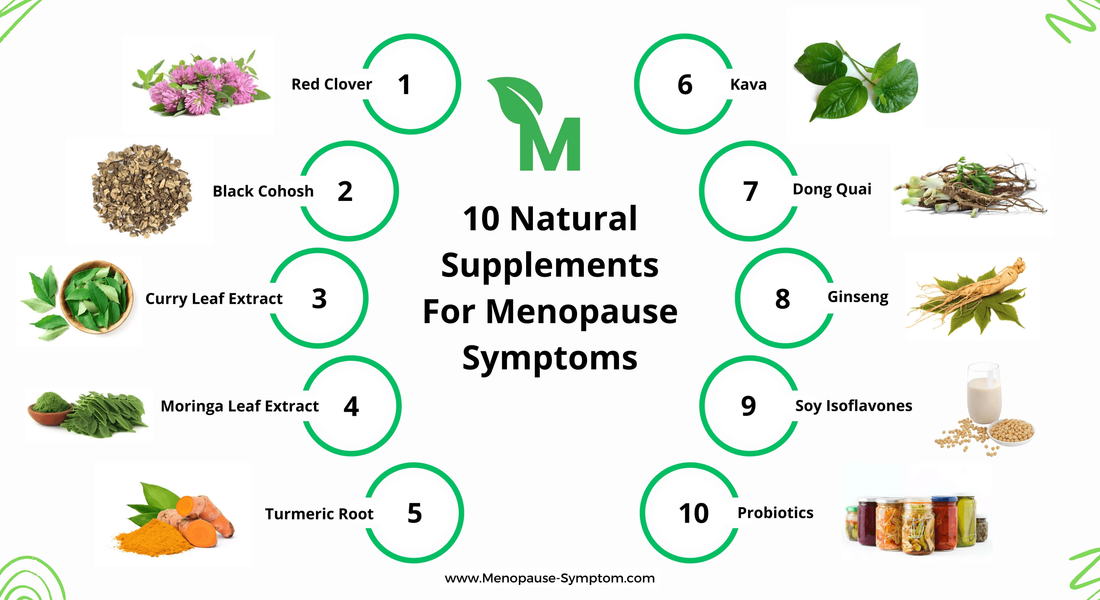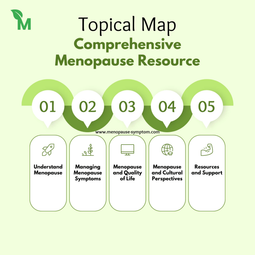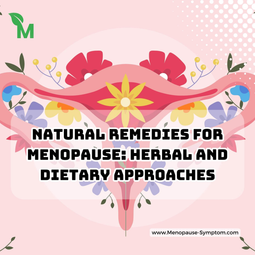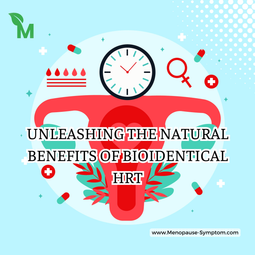10 Natural Supplements For Menopause Symptoms
On
22/10/2024Reading time:
2 min
Summary:
Discover the top 10 natural supplements that can help alleviate common menopause symptoms. Learn about the benefits of herbs, vitamins, and minerals for managing hot flashes, night sweats, mood swings, and more.

Most of the supplements listed have been used for hundreds and not thousands of years and have been used across many cultures. Is that proof enough that they work? There have been many studies done on traditional medicines, and the knowledge of traditional and folk herbalists seems absolutely stunning - how did people who practice traditional Chinese medicine or Ayurveda know all of this?
Menopause disrupts life, but every woman's journey is unique. Some experience mild symptoms, while others face hot flashes, night sweats, fatigue, and mood swings.
Lifestyle changes like exercise and diet can help. Supplements may offer additional support for a healthy body.
Confused by herbal options? Let's cut through the clutter.
1. Red Clover: A Natural Ally
Red clover, a common meadow flower, is a well-regarded natural supplement for women, particularly during menopause.
This humble plant contains isoflavones, acting like weak estrogens (phytoestrogens). They mimic the effects of your body's declining estrogen, potentially easing:
Hot flashes and night sweats
Bone density loss
Important Considerations
Red clover can interact with medications. Consult your doctor if you take birth control, hormone therapy, or blood thinners.
Herbal supplements are powerful. Treat them with respect to avoid side effects.
Focus on what matters: Manage your menopause journey with a healthy lifestyle and targeted supplements like red clover.
Additional Notes:
Removed unnecessary details about Red Clover's appearance.
Replaced "perfect supplement" with "targeted supplements" for conciseness.
Focused on core benefits of Red Clover without listing all potential effects.
This revision adheres to Hemingway's principles by using short, direct sentences and avoiding unnecessary embellishment. It maintains semantic entities (Red Clover, menopause) for relevance and ensures semantic conciseness and interoperability by focusing on the core message.
2. Black Cohosh: A Versatile Herb
Black cohosh, a North American native, has been used for centuries to alleviate various ailments. It's especially known for its potential benefits during menopause.
Originally used by Native Americans for fevers and menstrual issues, black cohosh gained popularity as a menopause supplement in Europe.
Benefits:
Hot flashes: Helps regulate body temperature.
Hormone-safe: Doesn't affect hormone-sensitive tissues like breast or uterine tissue.
3. Curry Leaf: A Spicy Solution
Curry leaf, a popular Indian spice, offers a variety of health benefits. It's rich in antioxidants and has potential anti-inflammatory properties.
Benefits:
Blood sugar and cholesterol: Helps regulate levels.
Heart health and brain protection: May reduce risk of heart disease and protect brain cells.
4. Moringa Leaf: A Nutritional Powerhouse
Moringa, a versatile tree, has been used as a medicinal plant for centuries. It's packed with vitamins, minerals, and antioxidants.
Benefits:
Mood and hormones: Reduces mood swings and supports hormone balance.
Inflammation and skin: Fights chronic inflammation and promotes healthy skin.
5. Turmeric Root: An Anti-Inflammatory Gem
Turmeric, known for its bright yellow color, is a powerful anti-inflammatory. It contains curcumin, a phytoestrogen with potential benefits for menopause.
Benefits:
Hot flashes and sleep: May alleviate hot flashes and improve sleep quality.
Gut health and inflammation: Supports gut health and reduces inflammation.
6. Kava: A Relaxing Herb
Kava, a plant native to the Pacific Islands, is known for its calming effects. It may be helpful for women experiencing anxiety or sleep disturbances during menopause.
Benefits:
Anxiety and sleep: May reduce short-term anxiety and promote restful sleep.
Liver caution: Consult your doctor if you have liver problems, as kava can affect it.
7. Dong Quai: A Traditional Chinese Herb
Dong quai, often called "female ginseng," has been used in Chinese medicine for centuries to treat various women's health issues.
Benefits:
Hot flashes and skin: May alleviate hot flashes and support skin health.
Medication interactions: Consult your doctor before taking dong quai, as it can interact with certain medications.
8. Ginseng: A Versatile Root
Ginseng is a popular herb known for its potential benefits for energy, focus, and overall well-being. While research on its effectiveness for menopause is mixed, it may offer some relief.
Benefits:
Hot flashes and sleep: May help reduce hot flashes and improve sleep.
Heart health and mood: May support heart health and reduce depression.
9. Soy Isoflavones: A Plant-Based Approach
Soy isoflavones, found in soy products and supplements, are plant-based compounds that mimic estrogen. They may be helpful for managing menopause symptoms.
Benefits:
Hot flashes and mood: May reduce hot flashes, irritability, and depression.
Joint pain: May help alleviate joint pain.
10. Probiotics
Probiotics, found in fermented foods like yogurt and kimchi, contribute to gut health. A healthy gut aids hormone regulation, nutrient absorption, and weight management – all concerns during menopause.
Benefits:
Emotional eating and digestion: Better control and improved digestion.
Weight management: May help reduce fat storage.
Sleep and energy: Promotes better sleep and increased energy levels.
Hot flashes: May contribute to hot flash reduction.
Gut health impacts stubborn fat storage in areas like belly and thighs. Paired with exercise, probiotics can boost energy and overall well-being.
Side effects: Temporary bloating or gas is possible.
Natural Options for Menopause
Many women opt for natural remedies to manage menopause symptoms like hot flashes, anxiety, and weight gain. Herbal supplements have been used for centuries across cultures.
Traditional Medicine Wisdom
Traditional medicine systems like Ayurveda and Traditional Chinese Medicine have a long history of treating menopause naturally. Modern science is now exploring the mechanisms behind their effectiveness.
Consult Your Doctor
Before taking any supplement regularly, especially if you're on medications or hormone replacement therapy, consult your doctor to avoid potential interactions.
Remember: Natural doesn't always mean safe. Use supplements responsibly.
Source: Team MPS compiled, analyzed and wrote. Please dont reup without source of us. Many thanks.




